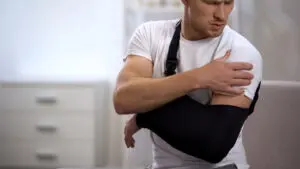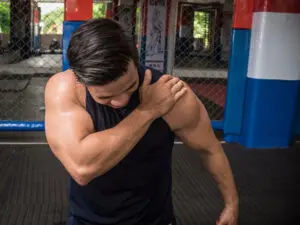Most of us don’t give a second thought to our shoulders, until we hurt one. We don’t realize how almost everything we do needs shoulder movement and flexibility, since being able to rotate our shoulder joints is key to most activities. An accident or any fall can cause a rotator cuff tear, and many times it necessitates surgery when all other treatments fail to provide relief. How long does it take to recover from rotator cuff surgery?
Patients Needing Rotator Cuff Surgery
Your rotator cuff is made up of 4 muscles and their tendons. Rotator cuff tears are more common in people over the age of 40 who do repetitive overhand work, sports or weight training. In younger patients rotator cuff tears can happen after an acute trauma or sports injury.
The result of rotator cuff injury is loss of motion, weakness, and pain.
How Long Is Recovery From Rotator Cuff Surgery?
How long it takes to recover is dependent on the size of the tear. The goal is full range of motion and full strength.
In general:
- It takes 6 to 8 weeks for the tendons to heal to the bone.
- Small tears take 4 months to recover.
- Larger tears can take 6 months to heal.
- Massive tears can take up to one year.
Steps and Tips For Rotator Cuff Surgery Recovery
Follow all guidelines from shoulder specialist Samuel Koo, MD, MPH for a complication free shoulder surgery recovery. Take any prescribed medication as directed.
Wear Your Sling
For best results wear the sling for 3 to 4 weeks. Move your fingers and wrist often, and use ice several times a day for 20 minutes for the first 24 hours.
Heat and Ice for Pain
Use an ice pack or a bag of frozen peas for the first 3 to 5 days to reduce inflammation. After that, heat should help with pain and stiffness.
Deep Breathing Is Important
Take deep breaths and cough frequently at least 3 to 4 times a day. This will reduce mucus from building up in the lungs and to prevent pneumonia.
Physical Therapy
PT usually begins about one week after surgery. Graduated activity and exercises to increase muscle strength continue for 3 to 4 months.
Sleeping
Sleeping may be difficult after surgery. Try sleeping in a recliner or in a reclined position in bed instead of lying flat on your back. You should wear your sling while sleeping.
Be Careful How You Move
Avoid putting any stress on your shoulder because it can delay healing. This includes reaching behind you, raising your arm above your head or out to the side, or lifting anything heavy. Wearing your sling will prevent you from doing these motions inadvertently.
Driving Restrictions
Patients are recommended not to drive until they have finished all prescription meds. You should also be out of the sling and able to place hands at 12 o’clock on the steering wheel.
Flying Restrictions
Patients can fly 2 to 3 weeks after surgery for short flights up to 2 hours. Wait 6 to 8 weeks for longer flights. Be sure to move around frequently during the flight to prevent clots.
Have Realistic Expectations
There may be some limitations of healing based on the age and size of the tear. With large tears in older patients, the tendon repair may not heal. Although pain relief and function are usually good, some weakness can remain.
About 90% of patients are satisfied with their shoulder after rotator cuff repair and they experience significant improvement in pain and function.
Contact shoulder surgeon Samuel Koo, MD at (425) 823-4000 for a diagnosis and treatment plan if you have shoulder pain that hasn’t healed, or request an appointment through our secure online form. Our shoulder clinic is in Kirkland, and we see patients from Seattle, Redmond, Bellevue, and the surrounding areas.




